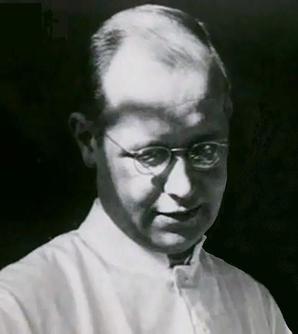Ernst-Günther Schenck facts for kids
Quick facts for kids
Ernst-Günther Schenck
|
|
|---|---|
 |
|
| Born | 3 October 1904 Marburg, Province of Hesse-Nassau, Kingdom of Prussia, German Empire |
| Died | 21 December 1998 (aged 94) Aachen, North Rhine-Westphalia, Germany |
| Allegiance | |
| Service/ |
|
| Rank | Obersturmbannführer |
| Battles/wars | World War II |
Ernst-Günther Schenck (born October 3, 1904 – died December 21, 1998) was a German doctor. He was also a member of the SS, a powerful organization in Nazi Germany. Schenck's personal writings became very important for history. This was because he had a brief meeting with Adolf Hitler at the very end of World War II. His stories about this time are used in books by Joachim Fest and James P. O'Donnell. These books describe the final days of Hitler's life. Schenck's accounts were also shown in the movie Downfall (2004).
Contents
Early Life and Medical Work
Schenck was born in Marburg, a city in Hesse-Nassau, Germany. His father was a professor at Muenster University. He taught subjects like classical literature and humanities. Ernst-Günther Schenck trained to become a doctor. Later, he joined the SS.
During World War II, Schenck helped create a large herbal farm. This farm was located at the Dachau concentration camp. It had over 200,000 medicinal plants. These plants were used to make things like vitamin supplements. These supplements were given to the Waffen-SS soldiers.
In 1940, Schenck became the inspector of nutrition for the SS. In 1943, he developed a special protein sausage. This sausage was meant to feed SS soldiers fighting on the front lines. Before it was used widely, it was tested on 370 prisoners. These tests happened at the Mauthausen-Gusen concentration camp. Some prisoners suffered from severe swelling due to hunger. Schenck later wrote that he only wanted to improve nutrition and fight hunger. However, a report in 1963 criticized Schenck. It said he treated people "like objects" during his research. After the war, Schenck was not allowed to continue his medical career in West Germany. He also worked with Erwin Liek. They tried to find holistic ways to prevent cancer.
Military Service and Awards
According to Hans Bottger, an SS officer, Schenck left his government job. He went to the Eastern Front to earn his "Iron Cross apprenticeship." This was during the first German campaign. Schenck proved himself while working as a battalion doctor. He did not just try to get an award like many others. Instead, Schenck took command of a gun battery. This happened after its commander was killed. Schenck performed well in combat. He earned the Iron Cross, Second Class.
Berlin in 1945
In April 1945, the Battle of Berlin was taking place. Schenck was told to leave the city with other SS staff. But he chose to stay. He volunteered to work at an emergency medical station. This station was in the large cellar of the Reich Chancellery. It was close to the Vorbunker and Führerbunker. Schenck was not trained as a surgeon. He also lacked the right supplies and tools. Despite this, he helped with major surgeries on wounded soldiers. Dr. Werner Haase assisted Schenck during these operations. Haase was one of Hitler's personal doctors. Haase had more surgical experience than Schenck. However, he was very weak from tuberculosis. He often had to lie down and give Schenck verbal advice.
By April 28, the medical station desperately needed supplies. Schenck drove a Wehrmacht truck into Berlin. He went to get medical supplies for the station. After returning, Schenck continued his surgical work. Over seven days, Schenck and Haase performed about "three hundred and seventy operations." After the war, he told author James P. O'Donnell about the terrible conditions.
During the final days in Berlin, Schenck saw Hitler twice. Each time was very brief. Once, Hitler wanted to thank Schenck, Haase, and nurse Erna Flegel. He thanked them for their emergency medical help. The second time was at a "reception" after Hitler married Eva Braun. In the early morning of May 1, 1945, Haase told Schenck that Hitler had died. Schenck was later captured by the Soviet Army. This happened during an attempt to break out of Berlin on May 1. After they surrendered, Schenck, Wilhelm Mohnke, and other German officers were given a meal. This was by the Chief of Staff of the 8th Guards Army. It was with permission from Lieutenant General Vasily Chuikov. At 10:30 pm, the Germans were moved to another room. There, they were held under guard. On the night of May 3, Schenck and the other Germans were handed over to the NKVD. Schenck was released from Soviet captivity in 1953. He returned home to West Germany. He then worked at Chemie Grünenthal, which is now Grünenthal GmbH.
Before writing his memoirs, Schenck was interviewed by O'Donnell. This was for the book The Bunker. The book shared parts of Schenck's memories of Hitler's last days. Schenck was the first to explore the idea that Hitler might have had Parkinson's disease. He published his thoughts and findings in a book. It was called Patient Hitler. Eine medizinische Biographie (Patient Hitler. A Medical Biography) in 1989. Schenck passed away on December 21, 1998, at the age of 94 in Aachen.
Film Portrayals
Ernst-Günther Schenck has been shown by these actors in movies and TV shows:
- The character of Dr. Hohenegg in Jonathan Littell's Les Bienveillantes is partly based on Schenck.
- Frank Gatliff played him in the United States TV show The Bunker (1981).
- Christian Berkel played him in the German film Downfall (2004, Der Untergang).
See also
- Death of Adolf Hitler
 | Janet Taylor Pickett |
 | Synthia Saint James |
 | Howardena Pindell |
 | Faith Ringgold |

